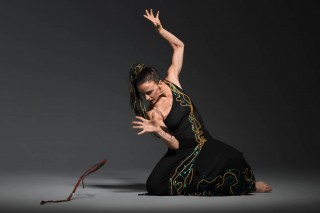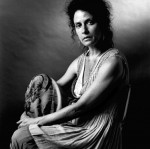Column Name
Title

Terese Capucilli as Medea in Martha Graham's Cave of the Heart
(Photo by John Deane)Terese Capucilli, who joined the dance faculty in 1999, grew up in Syracuse, N.Y., in a large and loving Italian family of seven siblings (she's in the middle) in which her dad, self-taught on piano, found calm in filling the house with music. Through a mentor, Joni Consroe, she first heard about modern dance and the SUNY Purchase dance division, where she ended up getting a BFA and also meeting Bill Randolph, an acting student who became her college sweetheart and husband. Capucilli was a principal dancer with the Martha Graham Dance Company from 1979 to 2005 and the artistic director from 2002 to 2005. A founder of and dancer with Buglisi Dance Theatre, she continues to work with choreographer and colleague Jacqulyn Buglisi on many projects, most recently the 9/11 Table of Silence Project, which has been presented at Lincoln Center for the last six years.
Body
When did you first know you wanted to be a dancer?
I don't know if I ever first became aware of wanting to be a dancer, I just always was. Miss Augustine was our local dance teacher and in second grade I started taking tap, jazz, and ballet from her. Augie also choreographed for our local musical theater group, and singing and dancing became my passion. I did everything from dancing atop beach balls in No, No Nanette to singing the soprano aria in Handel's Messiah and from teaching dance to my high school gym class to performing Mary in Jesus Christ Superstar.
What mentor most inspired you?
I had not one person who instilled a love of something in me, but many. The community of talented and inspiring people I was surrounded by in the musical theater groups that I grew up in became my heroes, mentors, and guides. These also included many of my siblings, as there could be as many as four Capucillis in a single production! Having a community of people who loved dance, music, and theater, I embraced it with everything I had to offer. The best part was that they made me feel I did have so much to offer, and so, I continued to learn from them how to give back to them and to the audience.
What dance performance changed the way you think about dance?
When I was young we couldn't afford to go to dance concerts or theater, but I saw a great deal of straight plays while volunteering to usher. This exposure helped to shape an awareness of the stage and of character development and illuminated a path into an understanding of dramatic and comedic acting. So it was really theater that changed the way I thought about dance because that was what was available to me. Who would have known then that I would reside so many years in Martha Graham's theater, where characterization was so important?
Any good Juilliard-Graham anecdotes?
The Graham work is vastly built on spirals and circular movement. For an entire year with one of my freshman classes I used the word cyclical over and over again to help the students understand the energetic movement generated in space. Near the end of the year, a boy raised his hand and asked, “What does the word cyclical mean?” Well, I nearly fell over and it was one of those teaching moments where I wondered where he had been the whole year! Now I ask first if the class knows what cyclical means. This has really stuck with me as one of the funniest and most devastating moments of my teaching life. At the time, I did not laugh!
What are you reading/watching?
I just finished From Squirt Blossom to Goddess by Linda Thomas, a biography of Helen McGehee (Juilliard faculty 1951-84), the great Graham dancer and teacher extraordinaire. I’ve never had the pleasure of meeting her although I spent all my years at Graham viewing her dancing on film and learning from her in this way. I love writing that makes me laugh hard and cry softly from some knowing place. I don’t watch TV generally, but my family is hooked on The Flash and Arrow—we have marathon nights once each new season comes on Netflix!
What advice would you give a non-dance person attending a dance performance?
Be receptive, sensitive, and always listen, even in the silences. I had a friend who told me he went to a play with five minutes of silence built into the action, and he was completely bored. I told him his sensory skills were being tested. We have the ability to be present in the moment, to see, to feel, to taste, to listen, to “touch” the silences. Life should be lived this way, otherwise you may miss out on something very gentle, very beautiful, something so simply human that it might make us uncomfortable. I feel it is here that we start to listen to our own hearts.





